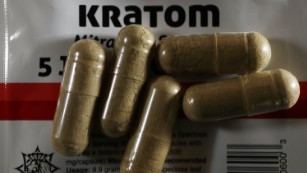The rise in the use of opioids has stirred concern as more people have reportedly died from overdosing on them. However, Kratom has been found to contribute to death in nearly 100 people in the last one year as opposed to more common ones like fentanyl, heroin, benzodiazepines (also known as tranquillizers), prescription opioids and cocaine.
Interestingly, some users believe that Kratom can help cure opioid addictions — and consume it as pills, capsules, or extracts.

What is Kratom
Found mainly in Southeast Asia, Kratom is a tropical tree (Mitragyna speciosa) with leaves that contain compounds that can have mind-altering effects. Also referred to as Biak, Ketum, Kakuam, Ithang or Thom, its leaves are sold in the United States online, and in bodegas and head shops, kratom has long been used as a mood booster, energy supplement and pain reliever.
What experts are saying about Kratom
Almost five million Americans consume kratom safely each year according to the American Kratom Association. The Kratom leaves are brewed as a tea by some people, while others chew or smoke them. Kratom can cause the effect of opioids and stimulants.
Two of its components referred to as mitragynine and 7-α-hydroxymitragynine, have been found to interact with opioid receptors in the brain, thereby producing sedation, pleasure, and dulls pain, according to Scott Hemby, who chairs the Department of Basic Pharmaceutical Sciences at High Point University in North Carolina — Disagreeing with with the FDA’s 2018 warning about the drug’s potential for abuse.
When consumed minimally, Kratom can act as stimulants, but when over consumed, it could serve as sedatives that dull pain — A feature that has drawn it to many people who want to withdraw from opioids. A lot of people who suffer from severe pain have run to the embrace of Kratom for sustenance as they drink its tea to diminish their pains.
Oliver Grundmann, a professor of medicinal chemistry at the University of Florida, who has been studying the supplement says it has been used in Southeast Asia for years and no cases of overdose deaths have been reported, though there have been reports of users becoming more addicted and tolerant of it with increasing doses
Reasons why experts want again it
Kratom consumption can cause nausea, itching, sweating, dry mouth, constipation, increased urination, loss of appetite, seizures, hallucinations and symptoms of psychosis.
According to FDA Commissioner Scott Gottlieb, in a statement in 2018, “Kratom should not be used to treat medical conditions, nor should it be used as an alternative to prescription opioids,” because there is no evidence to support its “medical use.”
He also notes that the chemical compounds in kratom are similar to those of opioids, saying there was no evidence to indicate that it was safe or effective for medical use.
Is it possible to overdose on Kratom?
Although there have been reports of deaths from Kratom ingestions studies have shown that they were taken alongside other medicines, substances and drugs.
Reports from the FDA have also shown that deaths associated with the use of kratom occurred mostly because users took them with contaminated products or with other potent substances, including illicit drugs, opioids, benzodiazepines, alcohol, gabapentin, and over-the-counter medications, such as cough syrup.
It has also reported that deaths have occurred after kratom was dietary supplements or dietary ingredients and were laced with other compounds.

Is it possible to be addicted to Kratom
Just like other opioids, users will definitely feel physical withdrawal symptoms when they stop taking kratom. Some people will feel muscle aches, insomnia, irritability, hostility, aggression, emotional changes, runny nose, jerky movements.
Is kratom addiction treatable?
Although researchers are still working on coming up with proofs that behavioural therapy could be used to treat kratom addictions, that is the only method that can be used for now.
Should Kratom be considered medicine?
Although no research data to back these claims, many people have used kratom as a herbal alternative to medical treatment to help control withdrawal symptoms and help treat or control cravings that follow addiction to opioids or to other addictive substances such as alcohol.
7 takeaways from the above
1. Kratom is a tropical tree native to Southeast Asia, with leaves that could have mind-altering effects.
2. It can be easily ordered from the internet
3. Researchers disagree on whether it is a medicine or whether it should be banned.
4. Users consume it as a pill or capsule — some even chew kratom leaves or brew the dried or powdered leaves as a tea. Because of two compounds in kratom leaves, mitragynine and 7-α-hydroxymitragynine, which interact with opioid receptors in the brain, it is said to produce sedation, pleasure, and dull pain.
5. Using kratom could result in health effects like nausea, sweating, seizures, and psychotic symptoms.
6. There is a possibility of dependence from the use of kratom leaves.
7. Some deaths have been reported from mixing kratom with other substances.




